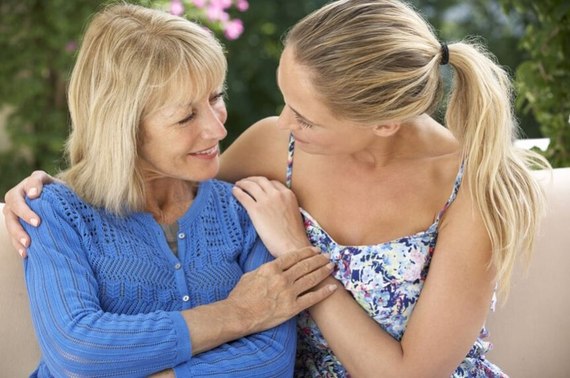Every person who has ever received a cancer diagnosis knows the value of having a medical team that is well trained to handle the medical aspects of their cancer treatment. We are so grateful to be able to work with those whose talents, expertise and experience can direct us through the tests and surgeries and follow up treatment that we hope will provide us with the best possible medical outcome. And if that was all that we needed, we could proceed through treatment and the subsequent years living and functioning exactly as we did before our diagnosis. But, the reality is that a cancer diagnosis changes everything, and I do mean everything -- not only for the patient but also for every single person in the patient's life and most notably for those on the front line of providing care and support and helping with every non-medical need that you can imagine. But, who is looking out for and taking care of those who are taking care of us?
For those adults who are the primary care givers, their lives, too, are changed immediately and forever. The frustration of not being able to do anything to take away or change that which the patient is facing weighs so heavily on them and that is only the beginning. The pressure is now on to not only continue their own daily lives, complete with all of their own obligations, but also to take charge of all of the other obligations that the patient will not be able to perform during treatment and recovery. And all the while, they also become the primary source of mental support for that patient, as well. In essence, the patient is receiving all of the medical treatment and support that they need from their team of doctors and the burden of their daily work is being assumed by another/others so that they are in a position to rest and recover. But, at the same time, that primary caregiver most likely has no support in dealing with the mental toll that this situation is taking on them and may also not have any help/support with all of the other additional work and tasks that have been heaped on them.
I think that we have all heard about what others are willing to do to help the patient during and after treatment but what about the caregiver who is dealing with a situation for which they have had no training or experience? They are most often forgotten by everyone as everyone rallies around the patient to do whatever they can to help them. That caregiver may be the single most important person for the patient having a successful and positive healing and recovery. And while many patients will continue to receive the treatments that they need on both a mental and physical level, a second thought is not even given to the healing and recovery that the caregiver may need after the patient is fully recovered.
We need to provide help and assistance to the caregivers who are giving or have given themselves over to help their loved one. Caregivers need to have support resources, too. They need to have someone with whom they can share their feelings and what they are going through with regard to the mental toll that is occurring. They need support groups or a professional who understands those things with which they are dealing and can provide ideas and suggestions for coping and letting them know that they are not alone in dealing with all of the associated issues that have landed upon them. And they need time off from the day-to-day care that they are providing for the patient. They need to have their own rest and relaxation time whether it is at a spa or a weekend getaway or a nice long hike or time spent with friends away from the topic of cancer. And when the patient is recovered, the caregiver should be rewarded for their enormous contribution in any way that those around them can figure out.
From my own experience, my primary caregiver, my husband, was the single most important factor in my recovery. To have the person who is the most important in your life being right by your side through such a journey (and twice, in my case) means more to you than anything else that could possibly be provided. There will never, ever be anything that I can say or do to thank him for all that he has done for me on so many levels and continues to do so today. But, to me, knowing that my cancer diagnoses and treatments, etc. have irrevocably changed his life forever is the single hardest thing with which I still deal. After all, when it comes right down to it, he has sacrificed his own life for me. How could I not want more for him and for all others who give of themselves to care for cancer patients in this way?
